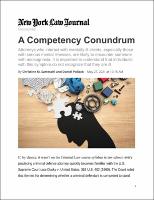Please use this identifier to cite or link to this item:
https://hdl.handle.net/20.500.12202/6825Full metadata record
| DC Field | Value | Language |
|---|---|---|
| dc.contributor.author | Pollack, Daniel | |
| dc.contributor.author | Sarteschi, Christine M. | |
| dc.date.accessioned | 2021-05-27T20:33:50Z | |
| dc.date.available | 2021-05-27T20:33:50Z | |
| dc.date.issued | 2021-05-27 | |
| dc.identifier.citation | Pollack, D. & Sarteschi, C.M. (2021, May 27). The competency conundrum. The New York Law Journal, https://www.law.com/newyorklawjournal/2021/05/27/a-competency-conundrum/?cmp_share | en_US |
| dc.identifier.issn | 0028-7326 | |
| dc.identifier.uri | https://www.law.com/newyorklawjournal/2021/05/27/a-competency-conundrum/?cmp_share | en_US |
| dc.identifier.uri | https://hdl.handle.net/20.500.12202/6825 | |
| dc.description | Legal commentary | en_US |
| dc.description.abstract | Attorneys who interact with mentally ill clients, especially those with serious mental illnesses, are likely to encounter someone with anosognosia. It is important to understand that individuals with this symptom do not recognize that they are ill. | en_US |
| dc.language.iso | en_US | en_US |
| dc.publisher | ALM Media Properties | en_US |
| dc.relation.ispartofseries | The New York Law Journal;May 27, 2021 | |
| dc.rights | Attribution-NonCommercial-NoDerivs 3.0 United States | * |
| dc.rights.uri | http://creativecommons.org/licenses/by-nc-nd/3.0/us/ | * |
| dc.subject | mental illness | en_US |
| dc.subject | competency | en_US |
| dc.subject | impaired judgment | en_US |
| dc.subject | anosognosia | en_US |
| dc.subject | forensic psychiatric evaluation of competence | en_US |
| dc.subject | Dusky v. United States, 362 U.S. 402 (1960) | en_US |
| dc.title | A competency conundrum. | en_US |
| dc.type | Article | en_US |
| dc.contributor.orcid | 0000-0001-7323-6928 | |
| local.yu.facultypage | https://www.yu.edu/faculty/pages/pollack-daniel | |
| Appears in Collections: | Wurzweiler School of Social Work: Faculty publications | |
Files in This Item:
| File | Description | Size | Format | |
|---|---|---|---|---|
| Pollack Sarteschi 27May2021 art NYLJ A Competency Conundrum.pdf | 204.66 kB | Adobe PDF |  View/Open |
This item is licensed under a Creative Commons License

